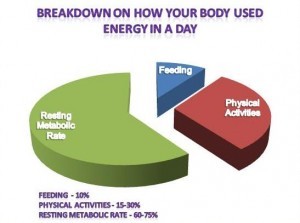Have you ever heard a conversation regarding weight loss go something like this 'I have a slow metabolism so it's harder for me to lose weight'? Or conversely 'I can't gain weight because I have a fast metabolism'. If you've made efforts to lose weight yourself, or work in the health & fitness industry, no doubt you've heard such a conversation. And it makes sense. If our metabolism is the sum-total of all the reactions occurring in the body i.e. anabolism + catabolism, than a faster metabolism should burn calories and a slower one less. Well James Krieger, one of the presenters at our Okanagan Strength & Conditioning Conference, gave a great presentation on the fact that metabolism is not as important in determining who is lean and who is obese or overweight. Krieger was able to present evidence that our metabolism is not the gatekeeper with respect to our level of leanness. [caption id="attachment_5135" align="aligncenter" width="300"] Where your body expends calories. In the pie chart above we see that over the course of a day we spend energy in three different ways including our metabolism (60-75%), the food we eat (10%) and through our physical activity (15-30%). We already mentioned that our metabolism, or RMR in the pie chart, doesn't account for how lean we are. When he looked at feeding, also known as the thermic effect of feeding, Krieger presented that while there is a difference in the amount of energy we expend to eat protein compared to carbs and fats this wasn't enough of a value to account for the difference in leanness. So this left physical activity as the only possible contributor to how lean someone is or isn't. [caption id="attachment_5136" align="aligncenter" width="300"] Physical activity can be broken down into exercise and Non-Exercise Activity Thermogenesis (NEAT). And there were a...
